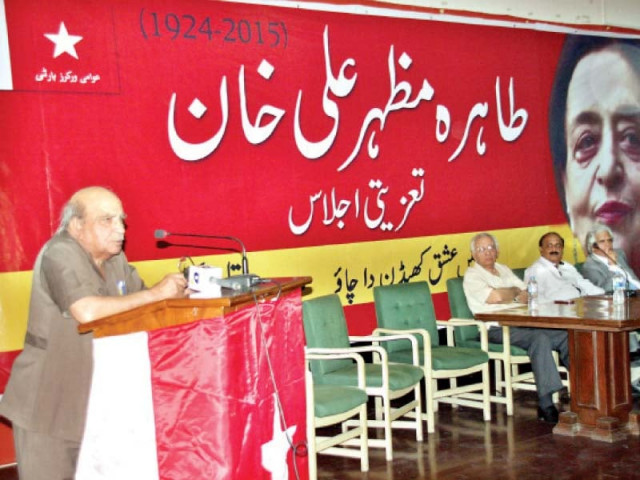In memoriam: ‘Tahira Mazhar wanted an egalitarian society’
Human rights defenders pay tribute to the deceased rights activist.

Human Rights Commission of Pakistan general secretary IA Rehman speaks at a reference held for Tahira Mazhar Ali on Saturday. PHOTO: ABID NAWAZ/EXPRESS
“Separating Tahira Mazhar Ali’s personal life and politics is not easy,” ASR Resource Centre chief Nighat Saeed Khan said on Saturday.
She was speaking at a reference, organised by the Awami Workers’ Party, for the veteran activist who passed away on March 23.
Khan said she had urged Ali to write her autobiography. “She replied, ‘You can write it for me after I die but make sure that you only write about things related to my political struggle.’”
Khan said Ali had been politically conscious from a young age. “At the age of 12 she realised that her father was not anti-imperialist and started writing letters to [former Indian prime minister Jawaharlal] Nehru,” she said. “He not only replied to her letters but also sent her books to read,” she said.
She said that during her time at Queen Mary College, Ali was exposed to Marxist ideology by her friend Perrin Ramchandra, a member of the Communist Party of India.
She said Ali had wanted to invite Nehru to speak at her college but was not granted permission by the administration. A man, she was told, could not be invited to a girls’ institution.
“She pointed out that the school had had no problem in inviting [Indian dancer and choreographer] Uday Shankar the week before. For this she was expelled from school,” Khan said. She said that initially Ali’s role in the Communist Party had been of a courier. She would use her family’s status to access people and places that would not have been open to others.
She said Ali’s struggle had been for peace. Peace was the first principle of the Democratic Women’s Organisation that she founded. “She was a mentor, a mother and a colleague to me. She was a member of the ASR board for the past 15 years,” she said.
Human Rights Commission of Pakistan general secretary IA Rehman remembered Ali’s role during the movement against the military operation in East Pakistan in 1971. He said the issue came up at a writers’ conference in Islamabad after the independence of Bangladesh. “She went onto the stage, and without any fear, stated that Pakistan should apologise to Bangladesh for the injustice against its people,” he said.
Abid Hassan Minto said Ali had worked for an egalitarian society.
He said Ali’s struggle had been against capitalism and the inequality it promoted, both at a global and a national level. “The third world has remained the third world while developed countries have become richer,” he said.
Minto said she was among the few people who continued to question capitalism despite its rampant spread and acceptance. “She was a unique individual who would question everything… we must learn from that,” he said.
Minto said problems like Talibanisation and Al Qaeda were the product of capitalism. “We spoke against the intervention in Afghanistan… we were called soviet agents,” he said.
“Tahira’s struggle will continue because her ideology is alive,” he said.
AWP Lahore chapter president Zahid Pervaiz said Ali had worked for labourers.
He said he had first come across her at a rally in Mochi Bazaar against the US involvement in the Vietnam war. “I still remember how she managed the rally.”
Ahsan Wyne, former secretary general of the Awami National Party, said even as a 16-year-old, she had been well-read and aware of the political realities of her time. A fearless activist, she had argued that partition of India along religious lines would culminate in bloodbath and rape, he said.
Published in The Express Tribune, May 17th, 2015.



















COMMENTS
Comments are moderated and generally will be posted if they are on-topic and not abusive.
For more information, please see our Comments FAQ